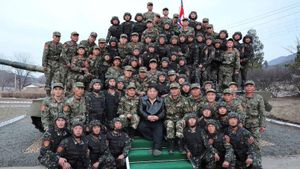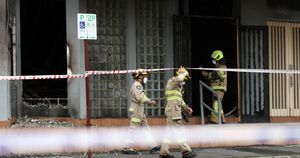Arsenal hosted Manchester City at the Emirates Stadium on February 2, 2025, for what many viewed as a pivotal clash within the Premier League, one laden with title aspirations and fierce rivalry. With Liverpool significantly extending their lead at the top of the table, the Gunners knew they needed to secure three points against the reigning champions to keep their championship hopes alive.
Kicking off at 4:30 PM GMT, Arsenal looked to bounce back from last week’s narrow 1-0 victory against Wolves, which was marred by referee controversies. The Gunners utilized their home crowd to rally as they faced City, who entered the match with newfound momentum, gathering four wins from their previous five Premier League encounters.
Mikel Arteta's side lined up with notable players like David Raya, Oleksandr Zinchenko, and the attacking talents of Kai Havertz and Martin Ødegaard, aiming to exploit any vulnerabilities from the City defense. Manchester City, under Pep Guardiola, were without their first-choice goalkeeper Ederson due to injury but fielded the likes of Erling Haaland and the promising midfielder Omar Marmoush to spearhead their offensive efforts.
The match was steeped in tension, reflecting the animosity between the two clubs. The previous encounter this season had ended controversially with Haaland's heated exchanges with Arteta and Gabriel. Arsenal's 2-2 draw with City had witnessed tempers flare, particularly after Stones scored the last-minute equalizer, leaving fans on both sides divided over officiatory decisions made during the dramatic clash.
Other historical aspects were revisited as well. City had not beaten Arsenal since their stunning streak of 12 consecutive wins against the Gunners, and were now winless in the last three encounters—an aspect the Arsenal camp took pride in as they prepared for battle. The rivalry was palpable not just on the pitch but also off it, as tensions rose concerning the affiliations of both clubs’ upper managements.
With Arsenal trailing Liverpool by nine points, the stakes were extraordinarily high. A victory would keep Arsenal's title race alive, but losing would leave them with bleak prospects. Media pundits, including former England defender Matt Upson, emphasized the importance of capitalizing on significant scoring opportunities, voicing concerns over Havertz's earlier missed chance. "What is Stefan Ortega doing? It is really poor from the Arsenal striker, Kai Havertz. He will be so frustrated with himself. That's a big mistake to miss,” Upson remarked, showcasing the weight of expectations on the players.
During the first-half exchanges, Arsenal was quick to assert dominance: they displayed energetic movements and a relentless pursuit of opportunities. An early surge saw Martin Ødegaard produce exciting interplay, taking advantage of Aarijan Akanji's errors from the City backline, resulting in disallowed and near-goal moments. Fans within the stadium were treated to spirited attacks, but Manchester's defensive line gradually began to stabilize under pressure.
On the counter, City began to exert themselves, with wide play initially drawing Arsenal's defenders out of position. The first hallmarks of City’s attacking prowess emerged through efforts from Haaland, who continuously looked to exploit Arsenal’s defensive weaknesses. The Merseyside outfit was on the radar, and the battle was multifaceted—both teams strived for control, each playing tactical mind-games with each other.
By halftime, both teams remained goalless, but the game was far from lacking excitement. City’s goalkeeper Ortega had come under scrutiny after shaky moments, and there was anticipation as to how he would respond following the criticism from analysts and pundits alike.
Yet as the second half got underway, Arsenal knew they had to convert any opportunities quickly, realizing the balance was delicate. Liverpool had already cemented their points, and Arsenal needed to capitalize fully on their home advantage. Insights from both Guardiola and Arteta suggested psychological fortitude would play as big of a role as physical prowess—managing emotions was key, especially against such fervent rivals.
Guardiola reflected on their previous games as he watched the dynamics evolve. "I am following the buildup with you from Cancun, and hoping the hotel bar has Max so I can watch most of the match,” said journalist Philip Cornwall, echoing sentiments of excitement shared not just by the players but also by supporters even from afar.
The final minutes of the encounter promised to bring chilling drama, with nervy exchanges and frantic attempts to edge the match as both clubs pushed forward. The atmosphere remained electric, combining adrenaline with the stakes at hand, and every passing minute felt monumental as both a title race and rivalry was reignited on the pitch.
Both sets of players understood what was at stake. The importance of the match contrasted with the energetic backdrop of London—Arsenal knew they needed to galvanize their fans and take chances, never overlooking the caliber of their illustrious opponents.
Whether the Gunners truly had it in them to topple one of their archrivals or whether City would demonstrate they are back on course to secure European football next season rested on the outcome of each moment.
With one eye on the ticking clock and another on each player’s every move, the football world remained glued to the event—the moment of truth awaited.



